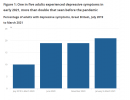initiation
Member
- Joined
- 10 Nov 2014
- Messages
- 432
I would then go further, and suggest that formalising this as a lockdown mitigated the economic harm, by making the effect on businesses less random.
Counteracted by the fact that lockdowns unnecessarily have a long tail in the name of being "cautious". Does anyone think that considering cases are so low we wouldn't have had a very busy domestic holiday sector through March and April? Or that no one would have gone to the pub pre-July last year?
The support is very low for some sectors. Furlough only covers one (albeit important) aspect of business.




